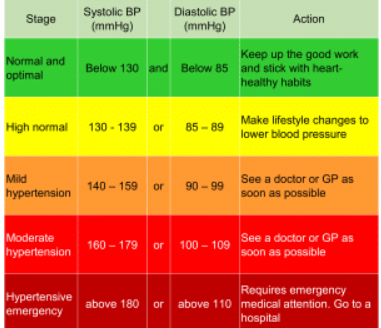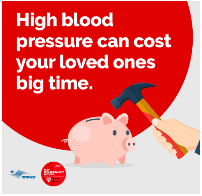Do not wait for symptoms to appear, high blood pressure is real…! Hypertension (high or raised blood pressure) is a condition in which the blood vessels have raised pressure, created by the force of blood pushing against the walls of the blood vessels as it is pumped by the heart through the veins. The higher the pressure, the harder the heart must pump.
Blood pressure is written as two numbers. The first (systolic) number represents the pressure in blood vessels when the heart contracts or beats. The second (diastolic) number represents the pressure in the vessels when the heart rests between beats. Hypertension is diagnosed if, when it is measured on two different days, the systolic blood pressure readings on both days is ≥140 mmHg and/or the diastolic blood pressure readings on both days is ≥90 mmHg.


Figure 1. A guide to your blood pressure reading
High blood pressure is a major risk factor for heart disease, strokes, kidney disease, even eye disease, and is reported to be responsible for 13% of all deaths globally. It is frequently described as a 'silent killer' because there are rarely any symptoms or visible signs to warn that blood pressure is high. In South Africa, more than 1 in 3 adults live with high blood pressure and it is responsible for 1 in every 2 strokes and 2 in every 5 heart attacks. That is why more than 50% of people with high blood pressure are unaware of their condition.
Africa has the highest prevalence of hypertension (27%) and it is one of the continent's greatest health challenges after HIV and AIDS. In South Africa, hypertension is the single most prevalent cardiovascular disease (CVD) risk factor and the predominant contributor to cardiovascular diseases (CVD) morbidity and mortality. South Africa has the highest prevalence of hypertension in sub-Saharan Africa, and the largest number of people whose blood pressure is still not controlled, even whilst being on treatment.

Symptoms and signs typically associated with very high blood pressure may include:
♡ headaches
♡ visual disturbances
♡ nose bleeds
♡ nausea
♡ vomiting
♡ facial flushing
♡ sleepiness
What can cause high BP?
There are various physical and lifestyle factors that can make you more likely to develop high blood pressure.
♡ Family history: a close member of your family has high blood pressure.
♡ Age: the likelihood of blood pressure increases with age. Nearly 8 in 10 South Africans over the age of 55 years have high blood pressure.
♡ Physical inactivity.
♡ An unhealthy diet, especially one that is high in salt and low in fruits and vegetables.
♡ Being overweight or obese.
♡ Drinking too much alcohol.
♡ Smoking and tobacco use.
How can I manage my blood pressure?
Making small lifestyle changes can make steady improvements in blood pressure. Together, these changes can make a big difference!
♡ Eat a healthy, balanced diet. Regularly eating plenty of fruits, vegetables, whole grains, lentils and beans, and low-fat dairy have been proven to effectively reduce blood pressure.
♡ Cut down on salt. A high salt intake is linked to high blood pressure. Reduce the salt added to food during cooking and at the table. Make use of fresh and dried herbs, spices, garlic and ginger, chili and lemon juice to add flavour to food. Foods like packet soups, stock cubes, gravies, cheese, many breakfast cereals, breads, salty snacks, processed meats and fast foods are very high in salt, so should be used sparingly too.
♡ Get active. Regular moderate- to vigorous-intensity aerobic physical activity can effectively reduce systolic blood pressure. It is recommended that adults exercise at least 150 minutes a week. Consult your healthcare provider on what type of exercise will best suit you and remember it should be something you enjoy doing so why not make it fun?
♥If done on most or all days, you can benefit from moderate activities like brisk walking, gardening and yard work, moderate to heavy housework, dancing and home exercises.
♥Vigorous activity may include, hiking or jogging, cycling, swimming or rowing.
Look for ways to add more physical activity to your daily routine. Making small changes in your lifestyle can make a big difference in your overall health. Here are some examples:
♥ Take a walk for 10 or 15 minutes during your lunch break.
♥ Take stairs instead of escalators and elevators.
♥ Park farther from the store and walk through the parking lot.
♡ Be smoke-free. After each cigarette blood pressure will temporarily increase for 30 minutes! Chronic smoking increases the stiffness of blood vessel walls, making the damage caused by high blood pressure even worse.
♡ Achieve and maintain a healthy weight. If overweight, losing even 2 to 5 kg of weight can already help to reduce blood pressure, and even greater reductions can be achieved with further weight loss towards a healthy weight.
♡ Manage stress. Stress and anxiety can directly increase blood pressure and indirectly lead to unhealthy habits such as poor dietary choices, not enough exercise, and tobacco or alcohol use.
♡ Limit alcohol. Women should not regularly exceed one alcoholic drink per day, and men should not drink more than two alcoholic drinks per day. People with very high blood pressure should ideally avoid alcohol completely or discuss their alcohol intake with their doctor first.
♡ Take medication regularly. Not taking blood pressure medications correctly is one of the most common causes of uncontrolled high blood pressure. Prescribed medication for hypertension should be taken regularly as instructed by a doctor or nurse.
♡ Know your numbers. Even when taking blood pressure medication, blood pressure may remain too high or increase again over time. Blood pressure should be checked regularly, or as recommended by a doctor or nurse.
If you are concerned that you might be at risk of developing or been experiencing any of the symptoms related to hypertension, please make an appointment with one of our CHS physicians or nurse practitioners at 021 8083494.
If you are looking to make a definite lifestyle change (related to exercise), you are also welcome to contact our CHS Physiotherapy practice by calling 021 808 3392 on how to get started in order to get your blood pressure under control.

